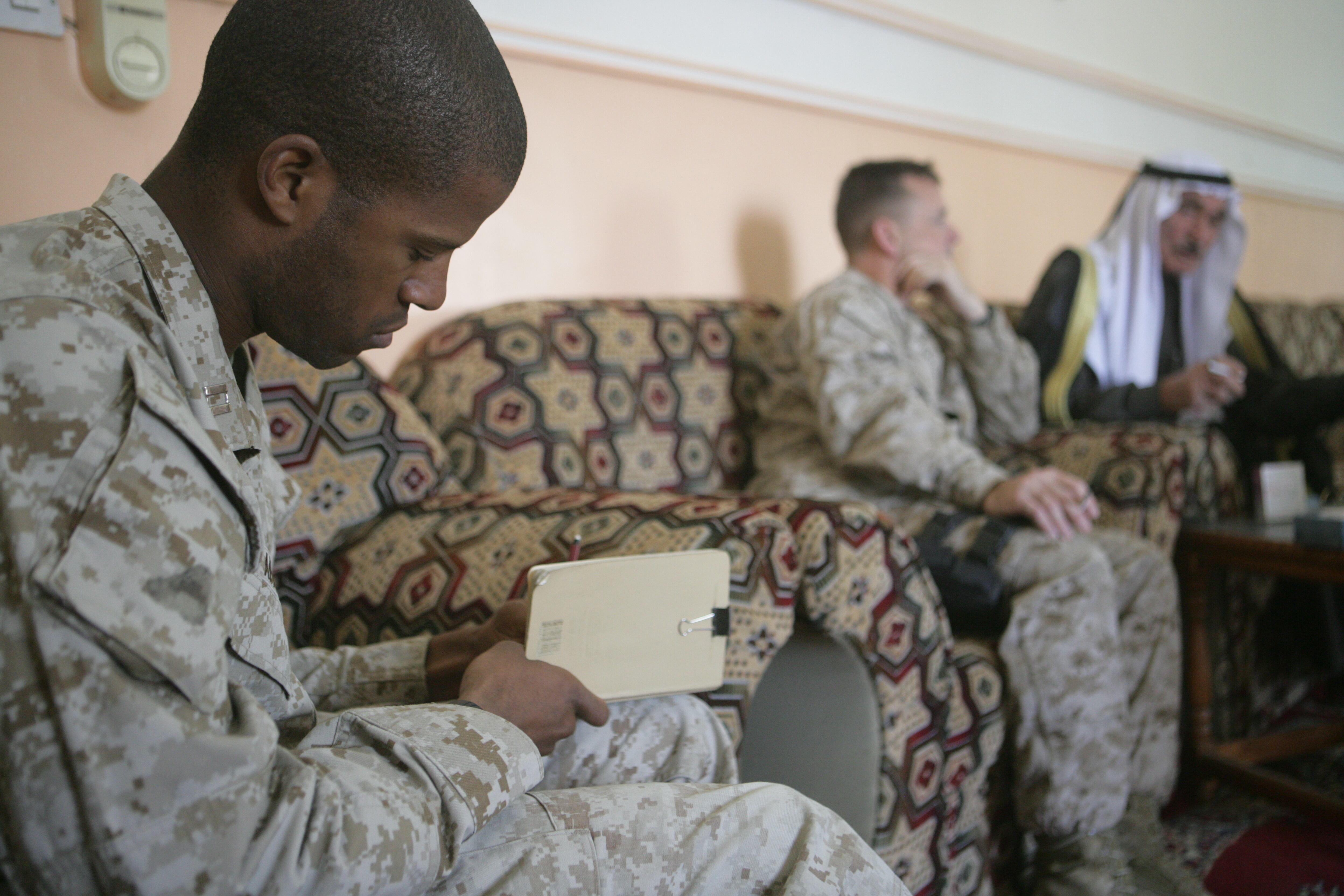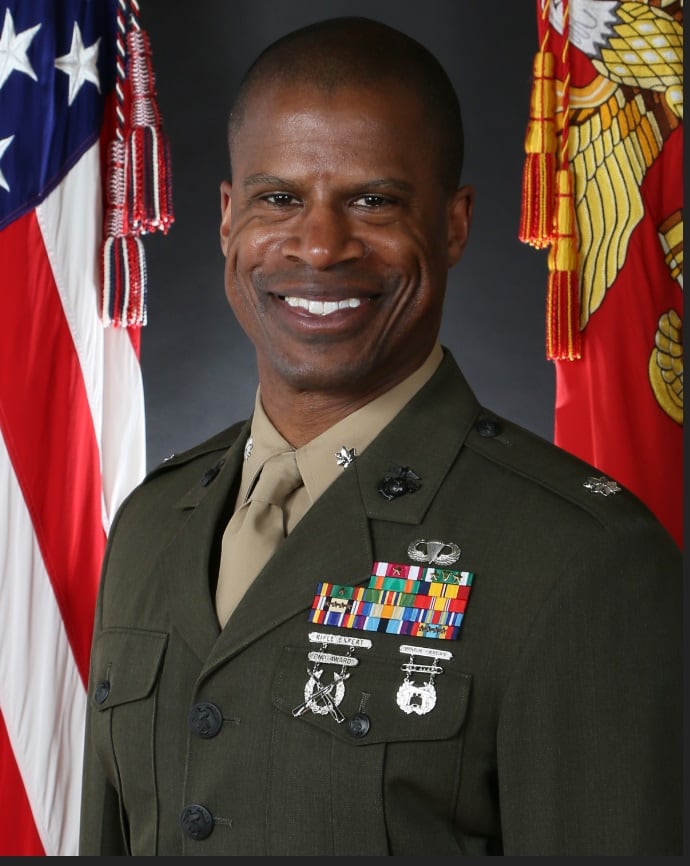Almost as important as his M4, hand grenades and supporting fires, a tool that a young Marine 1st Lt. Agur Adams pulled from his kit while on patrol in Iraq in the mid-2000s provided its own “war-fighting function” and a slightly softer touch: Beanie Babies.
During the hot days of his multiple Iraq deployments between 2004 and 2008, Adams and the Marines he led ― from scout sniper teams to reconnaissance platoons ― met many local leaders and took the opportunity to hand over the squishy toys to children.
The act felt good. It helped to help. And the kind gesture balanced the rougher purpose his Marines executed each night as they hunted the enemy.
It also served a larger purpose, building a “prevailing narrative,” a way to show the population that he and his Marines cared.
RELATED
That prevailing narrative term, it wasn’t a part of the discussion then, but on the ground, through multiple deployments, young leaders such as Adams saw information emerging as a critical piece of winning the fight.
More than a decade later, the Marine Corps has defined “information” as a war-fighting function, built the Marine expeditionary force information group, or MIG, and established a deputy commandant of information, a three-star general position.
In June, the Corps released its Marine Corps Doctrinal Publication 8, Information, setting down the fundamentals of how the service wants its Marines to include information in all planning, exercises and operations.
Though the language is new, some of what Adams and thousands of other Marines saw in the most recent wars echoes what’s become a priority for the Corps: information used to enable maneuver warfare or even deterring a fight before it erupts.
“Information was not part of that conversation,” Adams told Marine Corps Times. “We were focused on this idea, find then capture or kill or eliminate the enemy in some way, shape or form.”

But the beginnings, such as the Beanie Baby example, were surfacing, and in troubling ways.
Adams remembers when he first started seeing terrorist and insurgent groups staging attacks on Marine positions almost purely so that they could video record them and post them as online propaganda.
“As I progressed in my time, I saw that as a technique the enemy was using again and again and again to get out their prevailing narrative,” Adams said. “It became real for me in that timeframe.”
Adams describes leaving the theater in 2009 after those deployments as a “Eureka!” moment when he saw just how much the enemy was using information to its advantage.
ISIS elevated the information warfare game, making high-production-value online videos and stretching their message across the globe.
At the same time, Adams was tracking information sources as part of the Special Purpose Marine Air-Ground Task Force across all of U.S. Central Command. He experienced the proactive and reactive or offensive and defensive evolution of information, as it played out in the region.
“It was not just getting information, but prioritizing information from other sources to tap into that to build a sight picture for a commander on where a crisis might emerge,” Adams said.
His scout sniper and recon experience led to adviser training in Iraq and later intelligence work with the Special Purpose Marine Air-Ground Task Force-Crisis Response combatting the Islamic State in 2017. Most recently, the now-Lt. Col. Adams, commanded 2nd Radio Battalion, Camp Lejeune, North Carolina.
Now a mid-career officer, Adams can offer deployment-earned guidance as his Marines learn how information affects everything they do. Though they likely already know some of it.
He said that many young Marines now are “digital natives” living much of their lives online. Explaining the landscape isn’t necessarily the focus.
Instead, Adams said, leaders can help define what a Marine’s new responsibilities are in this environment where Marines are always being watched, on the home front and on deployment.
Actions that lance corporals took in small Iraqi villages did have impacts that spread across the globe.
The 1990s-era vision of the “strategic corporal” formulated by then-Commandant Gen. Charles Krulak came into stark relief in those settings.

The environment has only grown more saturated with eyes watching and ways to blast that message out more rapidly and widely.
“Realize what the weight of your actions can carry, they have tremendous impact and therefore we need to act judiciously, and you need to understand and be aware of what those implications might be,” Adams said.
The Corps sees a training need there too.
Marine Corps Times sister publication C4ISRNET reported in June that MCDP 8, Information calls for media literacy training across the ranks.
U.S. forces have been complacent, Deputy Commandant of Information Lt. Gen. Matthew Glavy told reporters in a June 28 interview session, assuming that information is “like the air we breathe” and will always be available and there are no consequences to using it incorrectly.
From collecting to verifying preserving and using information, Marines at every rank need a reframed focus on the vital importance of information.
That’s because it’s not only the decisions Marines make in far-off combat outposts but what they’re doing online from their barracks rooms. They’re being watched by adversaries online, too.
The new doctrinal publication specifically cites ongoing events in Ukraine and how that conflict is being fought with information at a scale not previously seen.
Glavy told Marine Corps Times that as Marine leaders drafted the new publication, they paused to edit and add in specifics from the ongoing conflict at Commandant Gen. David Berger’s direction.
“When we are complacent with understanding the power of information, we will lose, we will lose,” Glavy said. “We see it time and time again: those who are slow on the uptake of messaging, and how important their narrative is … will have problems.”
Todd South has written about crime, courts, government and the military for multiple publications since 2004 and was named a 2014 Pulitzer finalist for a co-written project on witness intimidation. Todd is a Marine veteran of the Iraq War.





